|
34 London Road, St. Dunstan's
Canterbury
01227 454794 & 07903025193
https://whatpub.com/eight-bells
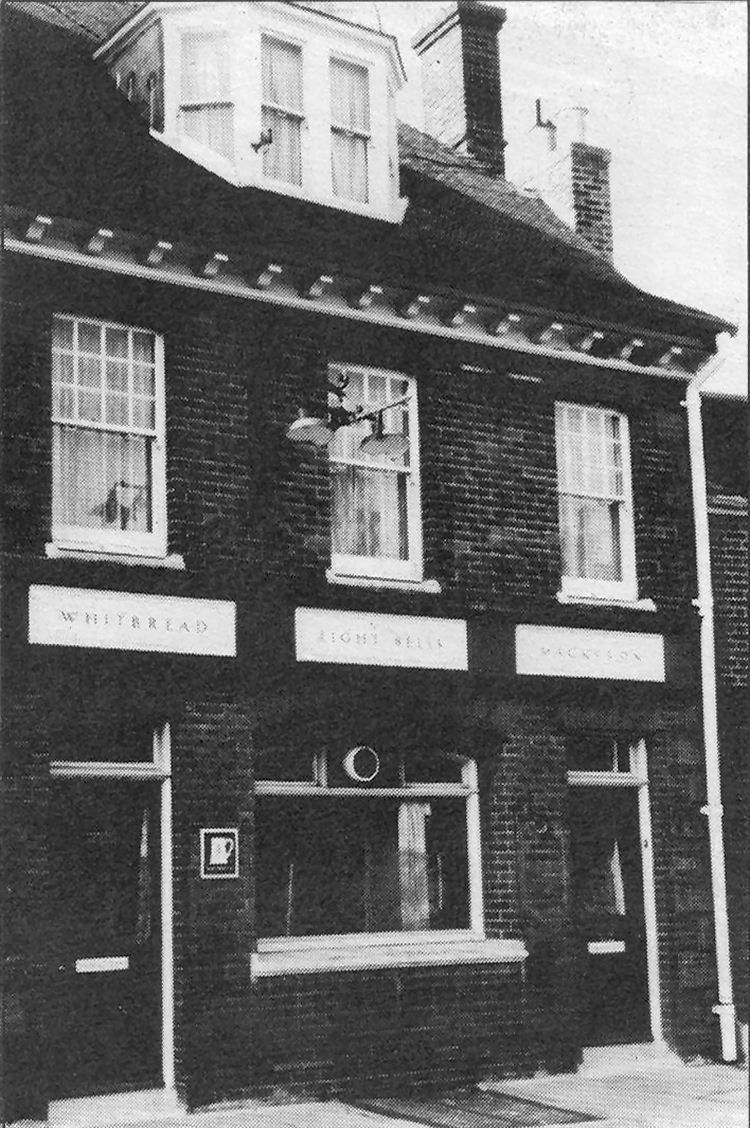
Above photo taken by Edward Wilmot in 1965. |
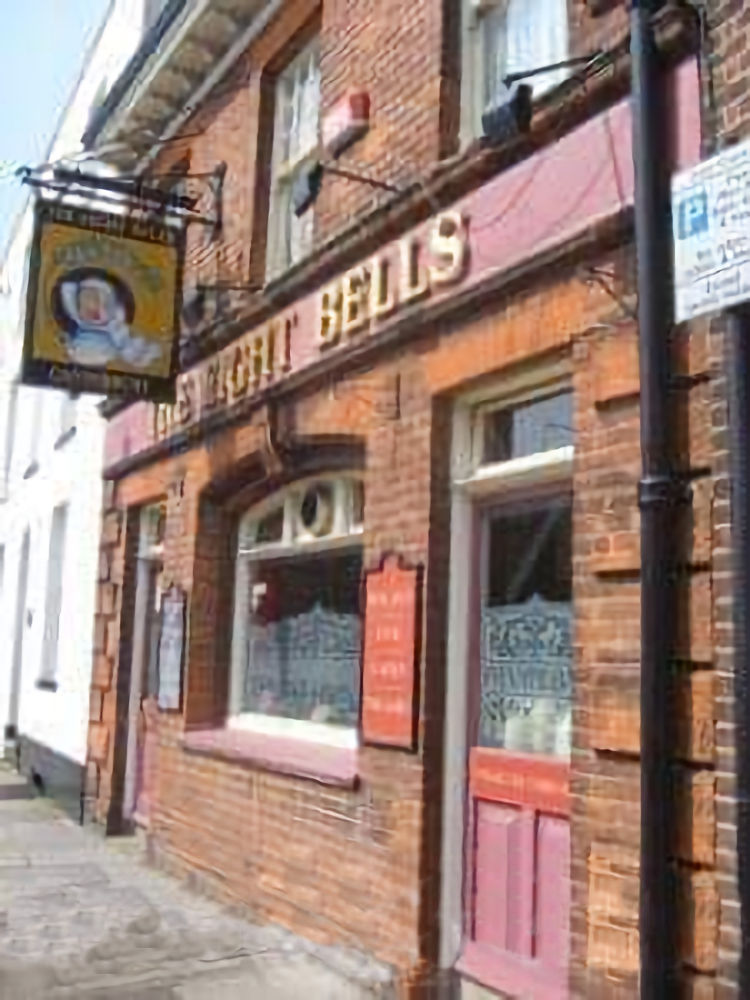
Above photo, date unknown. |
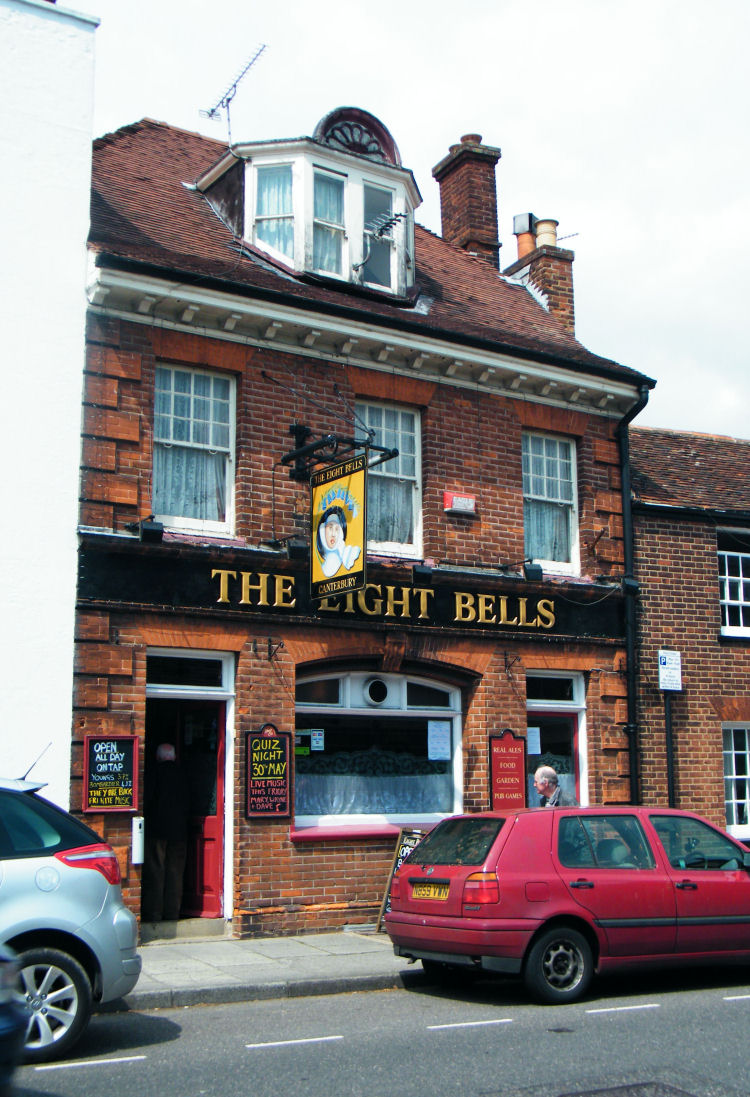
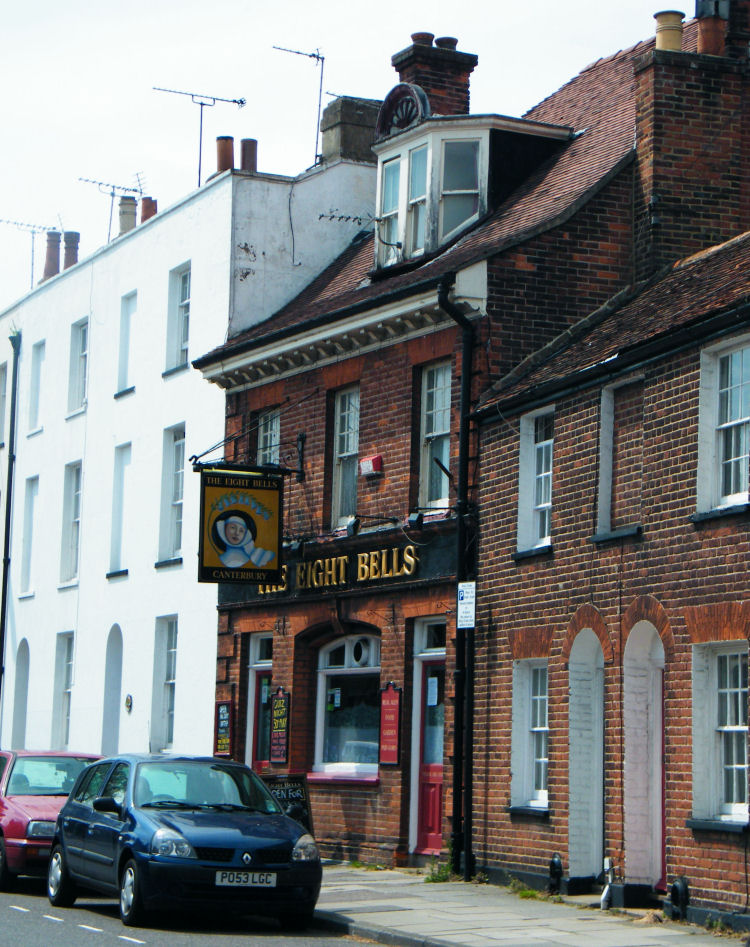 Above photos taken by Paul Skelton, 19 May 2012.
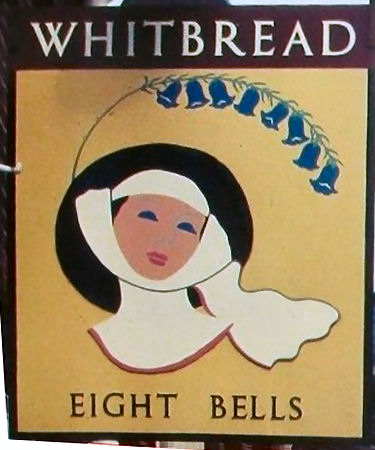 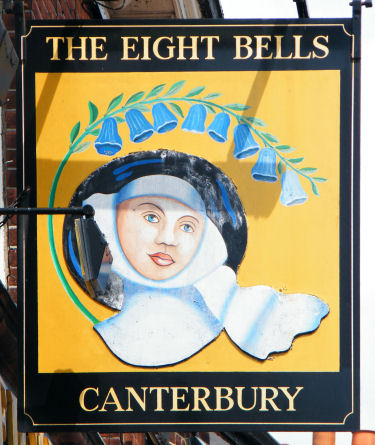
Above sign left, 1968, sign right, 2012.
|
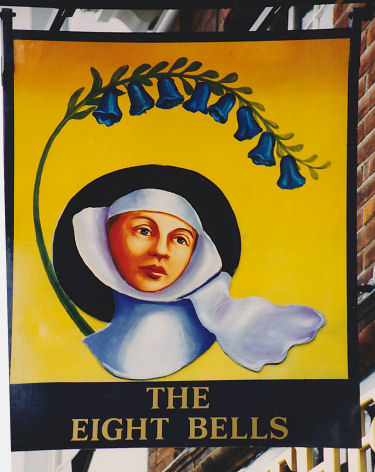 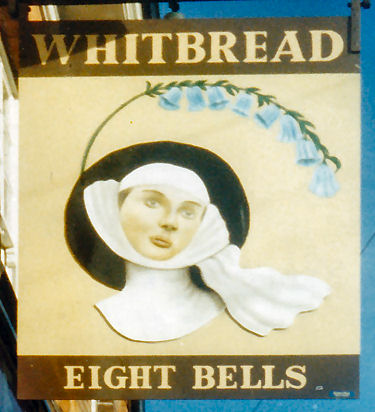
Eight Bells sign left July 1986, sign right May 1991.
Above with thanks from Brian Curtis
www.innsignsociety.com |
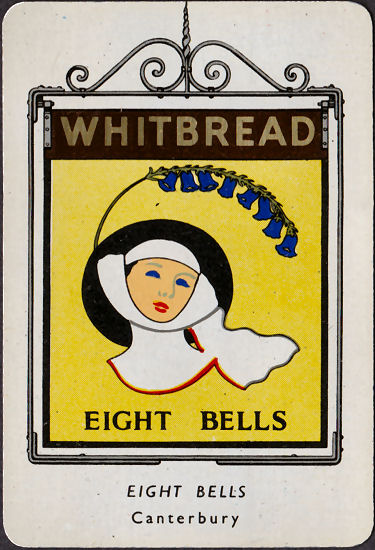
Above aluminium card issued June 1951. Sign series 3 number 14. |
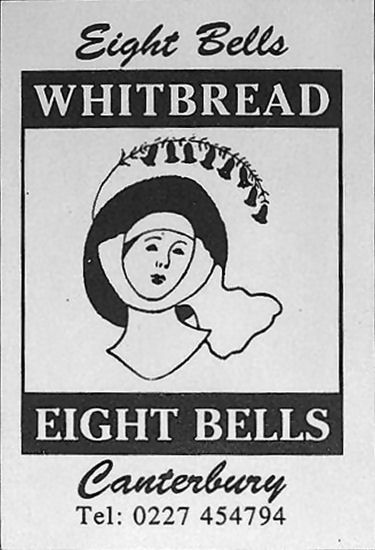
Above matchbox, 1980s, kindly sent by Rory Kehoe. |
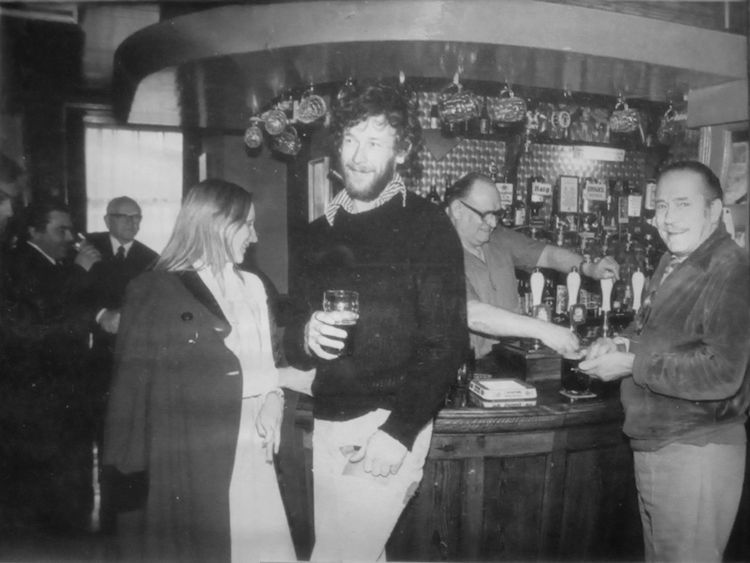
Above photo, 1981, kindly sent by Rory Kehoe. A photograph which, for
many years, graced the bar wall and which was found by Rory Kehoe in the
recent licensee retirement cellar clear out. Behind the bar, is the
redoubtable Jack Moat MM, who with his wife, Charlotte, ran the Bells
for 25 years. In WW2, Jack had been an 8th Army tank commander and
another bar photograph, which presumably was retained by Jack's family
his retirement, showed Sergeant-Major Moat receiving his Military Medal
from Field Marshal Bernard Montgomery himself. |
|
Information taken from pub in picture frame.
There has stood on this site an inn known as the "Eight Bells" for two hundred
and seventy seven years. The origin of the sign dates back to the
eleventh century and the days when Inns and Taverns stood within the
precincts of the parish churches. However many bells a particular church
held determined the number given to the name of the Inn. In this
instance the church of St. Dunstan's holds eight bells.
The first "Eight Bells" was built during the reign of Queen Anne
(1702-1714) in the year 1708, and was a rambling timber framed building,
with commodious livery stables at the rear, where traveller's horses
were kept at a charge or hired out. A sign depicting this service hung
outside the Inn for over a century and a half, and read "Bait and livery
stables." The word "Bait" is derived from an anglo-saxon word meaning
"to feed" and was used to designate a meal taken by travellers to
refresh them on a journey.
The first recorded owner of the "Eight Bells" was one Nathaniel
Laythem, who is described as being a vesturer of the City of Canterbury.
Although an ever popular stopping place for countless travellers and
local townspeople by the late nineteenth century the years and the
climate has taken its toll and the Inn had fallen into a state of
disrepair. It was finally demolished in 1898. Work started on the
present "Eight Bells" in August 1898 and was completed early in 1899,
having been built on the original foundations of the former Inn, and
with many of its original timbers.
The Inn today still gives out that same generous glow of warmth and
hospitality that it has done for over two and half centuries. So stay,
enjoy the fayre and reflect on those bygone days.
|
|
From the Kentish Weekly Post or Canterbury Journal 7 September 1819.
VALUABLE BREWERY,
Free Public Houses and other estates,
To be Sold By Auction, By Messrs. White, (Without Reserve).
Pursuant to certain orders of the Vice Chancellor of Great Britain, and
before the Major part of the Commissioners named and authorised in and
by a Commission of bankrupt awarded and issued against Matthew William
Sankey, of the City of Canterbury, brewer, dealer and chapman, at the
Guildhall, of the said city of Canterbury, on Wednesday next, the 22nd
day of September next, at eleven o'clock in the forenoon, (subject to
such conditions of sale as shall be then and there produced.)
The following very Valuable Freehold Estates, in Lots.
Valuable Brewery free public houses and other Estates to be sold by
auction by Mrs White without reserve.
Lot 9. A Messuage called the "Eight Bells," with the yard, garden, and
appurtenances, situated in St. Dunstans, (near Canterbury) in the said
County, and now in the occupation of Mary Wachers, widow.
|
|
From the Kent Herald, 19 December 1833
Assizes
Edward Summers, age 24, labourer, was indicted for stealing 10s. 4d.
from the person of Joseph Lebe. It appeared the prosecutor and several
other persons have been drinking at a public house called the "Eight
Bells," at Canterbury. (Could be the "Eight
Bells" in King Street.)
As Lebe was returning home about 1 o'clock in the
morning he was knocked down and robbed by a man whom he swore to be the
prisoner. The prosecutor swore positively to the prisoner's identity;
but it appearing by the testimony of the constable who apprehended him
that he had fixed at first upon another man, the prosecution was
abandoned, and a verdict of acquittal accordingly returned.
|
|
From the Kentish Gazette, 4 July 1843.
A young woman was found at half-past nine o'clock on Friday night last,
on the road between Harbledown and Canterbury, in an
almost dying state, with a child on her breast. Information was given to
the Superintendent of Police, who despatched three of his
men with a stretcher, and had her conveyed to the "Eight Bells," St.
Dunstan’s. Mr. Holttum was sent for, who attended her, and
it was more than half an hour before she was brought to a state of
consciousness. She still remains there in a very weak state.
What makes the case worse is, some villain had the cruelty to rob her of
nearly all her clothes while she lay helpless. She states
that her name is Hilgrove, that she is 18 years of age; that her husband
is a saddler, and left her with his father in Ireland to seek
work, and she received a letter from him stating that he had got work in
London; she went there with what trifle she could get
together, thinking to meet him there, but his master had discharged him
a few days before, having no more work for him. He said
on leaving he should go to Canterbury to try for work, whither she
proceeded from Gravesend on Friday with only 3d. in her
pocket, and walked and carried her child to where she was found, and
there dropped through exhaustion. Inquiry has been made
by the police for her husband, but he has not been found.
|
|
Kent Herald, 9 January 1845.
Canterbury Petty Sessions. (Guildhall). Before the Mayor and Magistrates.
Jan. 2. The licence of the "Eight Bells," St. Dunstan, was
transferred from John Marsh to James
Davis.
|
|
Kent Herald, 13 March 1845.
Canterbury Petty Sessions. (Guildhall). (Before the Mayor and Magistrates.)
March 6th. Authority granted to Abraham Seabrook to keep the "Eight Bells," St. Dunston,
until next transfer day.
|
|
Kent Herald, 10 April 1845.
April 7th. Authority granted to Edward Seabrook to keep the "Eight Bells,"
St. Dunstan's.
|
|
Kent Herald, 8 May 1845.
Canterbury Petty Sessions. Guildhall. (Before the Mayor and Magistrates.)
The licence of the "Eight Bells," St. Dunston, transferred from Joseph Davis to
Abraham Seabrook.
|
|
From the Kentish Gazette, 13 October 1857.
Monday. (Before Aldermen Brent & Plummer, and E. Holttum, Esq.)
Frederick Lyons of the 72nd Highlanders was charged with being a
deserter. The prisoner had been brought before the Mayor on Saturday
on this charge, and he was then discharged, on his promise to join
his regiment that night.
Instead of doing so he remained in the town, and Police-constable
Holloway took him into custody on Sunday at the "Eight Bells."
Prisoner said he was only absent without leave.
The Bench ordered him to be sent in civil custody to the depot of
his regiment at Shornecliffe.
|
|
From the Kentish Chronicle, 14 July, 1860.
Tuesday.
(Before W. Plummer and E. Sankey, Esqrs.)
George Lancaster was charged with stealing one pair of trousers and a
cup, of the value of 6s., from Mr. Thomas James, of the "Eight Bells
Inn," St. Dunstan's street.
Prisoner was found by Police-constable Fowler and taken into custody,
when he proceeded to the prisoner's house in Church-Lane, Northgate, and
under the pillow of the prisoners bed he there found the cap and
trousers.
The prisoner, who had nothing to say in his defence, was remanded.
|
|
South Eastern Gazette, 9 October, 1860.
Discovery of the Dead Body op an Infant.
Late on Thursday evening last, while some labourers were engaged
emptying a cesspool at the rear of some houses in the parish of St.
Dunstan, they picked up a parcel enclosed in an old piece of
sacking, which turned out to be the body of a child in an advanced
state of decomposition. The police were quickly informed of the
discovery, and inquiries were set on foot with the view of
ascertaining how the body of the deceased came at the spot where it
was found, and who are its parents, but nothing has been elicited at
all likely to clear up those points.
On Friday evening T. T. Delasaux, Esq., the city coroner, held an
inquest on the body of the child, at the "Eight Bells," on the Race,
St. Dunstan’s, when the following evidence was adduced.
Henry Burchett, of Thanington, deposed that he was employed, with
two other men, to empty a cesspool in the parish of St. Dunstan,
where he found the deceased swimming on the top of the soil, wrapped
up in a piece of sacking. Believed the body had been there some
weeks. Had not been to the place before last night.
Mr. Robert Tassell, surgeon, said he had examined the body of the
deceased, but from its decomposed state he was unable to say that it
was born alive. It was a full grown child. Mary Martin said the
place was used by six families, and was also easy to be got at by
the public.
The jury returned an open verdict of "Found dead."
|
|
From the Kentish Chronicle, 2 February, 1861.
The Supposed Coiner's Case.
Superintendent Davies’ statement of having seen the prisoner loitering
about having been read, P.C. Fowler was examined who said, on Monday
night about ten o'clock, I saw the prisoner come out of the "Eight
Bells." He complained to me of some parties in there who had been
ill-using him. I told him to go to the station-house but did not take
him into custody. When at the station he was searched and a spoon and
some plaster of Paris found upon him, but nothing else to convict him.
Prisoner was discharged.
(This could apply to the other "Eight
Bells" in King street. Paul Skelton.)
|
|
From the Kentish Chronicle, 19 September, 1863.
CANTERBURY POLICE COURT.
SATURDAY — FURIOUS DRIVING.
Thomas James, son of the landlord of the “Eight Bells” public-house, St.
Dunstan’s, was charged with furiously driving down St. Martin’s Hill, on
the previous evening. The charge was preferred by H. G. Austin, Esq.,
J.P., who stated that he was returning to Canterbury on the previous
evening, when he observed the prisoner with a tug on the road. The
prisoner drove the tug about on the road as if with the view of
preventing him from passing. At length Mr. Austin got his carriage past;
but afterwards the prisoner drove his tug at a furious rate down the
hill, as if with the intention of driving into Mr. Austin’s carriage.
Fortunately, by drawing quite close to the side, an accident was
prevented. When Mr. Austin reached the foot of the hill he found the tug
standing outside the “Ship” public house, and when he endeavoured to
ascertain the name of the owner the prisoner abused and threatened him.
The magistrates fined the defendant 20s. and 6s. costs, with the
alternative of twenty-one days' imprisonment in default.
|
|
Dover Express anmd East Kent Intelligencer 9 December 1865.
Burglary By An Old Offender.
At the City Police Court on Tuesday, a man named William Ward alias
Macdonald, who has been several times convicted of felony, was
charged with having burglariously entered the house of John Goodwin
Fedarb, a newsman, living in Mill-lane, Canterbury, shortly before
six o'clock on Thursday morning, and stealing therefrom a silver
watch, two pair of cloth boots, one pair of Wellington boots, a blue
striped shirt, a silk handkerchief, and a blank cloth mantle. It
appeared from the evidence that the prosecutor got up between five
and six o'clock on Thursday morning, and left home at about twenty
minutes to six, fastening the front-door of his house as he went
out.
A few minutes afterwards Mrs. Fedarb, who was in bed, heard a
noise in the lower part of the house, and thinking it was caused by
her husband, she called out "Are you not gone yet?" but did not
receive any answer. Her daughter came into her bed-room, and just
then the cathedral clock struck six. Presently the fire-irons were
heard to rattle down stairs, and having listened a few minutes to
see if any other noise was made, Mrs. Fedarb went down into the
front parlour, and saw the door was open. She missed a silver watch
and a pair of cloth boots, and all doubt as to what had become of
these was removed when she discovered a pair of dirty old boots in
the middle of the room, and which had evidently been left behind by
the depredator in his hurry to get out of the house on finding there
were others about besides himself. Mrs. Fedarb sent for the police,
and later in the day the other articles named in the charge, and
which were seen about the house on the previous day, were found to
have been stolen.
Enquiries were instituted by Superintendent
Davies, and the result was that suspicion fell on the prisoner, who
on the night previous to the robbery had taken lodgings at the
"Eight Bells," a low lodging-house opposite the prosecutor's house.
When he went to the "Eight Bells" he was very drunk, and William
Hogben, potman, noticed the prisoner wore the strange boots found in
prosecutors front room. He got up between five and six o'clock on
Thursday morning, and having obtained two or three lucifars from
Hogben, he left the house.
It is probable that he then saw Mr.
Fedarb come out of his house, thinking there was no one else at
home, or that the other inmates were not about, prisoner by some
means not yet discovered. He says he did not break anything in
getting into the house, and it is not unlikely that Fedarb did not
latch the door as supposed. Superintendent Davies sent a description
of the prisoner to all the superintendents of police in the county,
and on Saturday morning he was apprehended in Globe lane, Chatham.
P. C. Kilby saw Ward going into a second-hand clothes shop kept by a
Mrs. Mace, and inspecting he was the who had committed the burglary
at Canterbury, he followed the prisoner into the shop and caught him
in the act of selling the missing silver watch. He told prisoner he
thought it was part of the proceeds of a burglary for which he was
wanted, when Ward said he did not steel the watch, and that he had
bought it nine months since.
Kilby then took the rascal before the
great terror to evil doers, Superintendent Everist, who at once
identified the fellow as an old acquaintance. At first Ward
repudiated the friendship, but after a gentle reminder from Everist
of a previous exploit in which he (prisoner) was the principal
actor, the fellow exclaimed "All right master, you come to me
to-morrow morning and I'll tell you all about where they are,"
meaning the stolen articles. He was then wearing a pair of boots
which he admitted on the following day, were part of the proceeds of
the robbery. He also admitted that he had taken the other property
named in the indictment, and that he had sold it on his way from
Canterbury, but as he came a round-about-read, he did not know where
he had disposed of it. In answer to the usual question by the
magistrates, prisoner said "I done the deed, bet I never broke
nothing." He was than committed for trial at the assizes, which
commence at Maidstone on Saturday the 16th December.
|
|
From the Dover Express, 22 October, 1869.
Public-house Offence.
On Thursday, Thomas James, proprietor of the "Eight Bells" public house,
St. Dunstan's, was charged with unlawfully selling a certain quantity of
beer in his house before half-put twelve on Sunday morning last.
Defendant pleaded in extenuation that out of the four men who were in
his house he gave a pint of beer each to two, they being in his house on
business. The other two persons told him they had been travelling by
road. The Supt, said the house was always kept very orderly. Fined 2s.
6d and 9s. costs.
|
|
Canterbury Journal, Kentish Times and Farmers' Gazette 30 May 1891.
CANTERBURY POLICE COURT CORRECTION.
In our Police Court news last week we inadvertently described Henry
Ditton, a publican convicted of keeping his house open during prohibited
hours, as the landlord of the "Eight Bells," St. Dunstan's. The house
kept by Hutton is the "Eight Bells," King's Street. The "Eight Bells,"
St. Dunstan's, is kept by a person of quite a different name, a highly
respectable man, against whom there have been no police proceedings
whatever.
|
|
From the
https://www.kentonline.co.uk By Gerry Warren, 16 February 2025.
Pub bosses accused of ‘schoolboy error’ over new sign at The Eight Bells
in Canterbury.
Pub bosses have been accused of dropping a clanger over a new sign hung
outside a Kent inn which has got regulars crying into their beers.
It follows the decision by Admiral Taverns to replace the much-loved
swing sign of The Eight Bells in Canterbury with a new one, depicting
the Bell Harry Tower of the Cathedral.
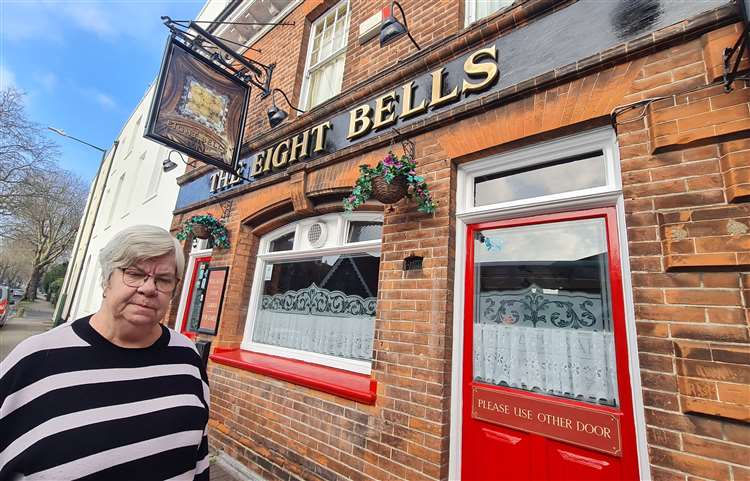
The landlady of The Eight Bells in Canterbury, Kim Truelove, with the
controversial new sign.
But Kent pub history expert Rory Kehoe says the company has not only
upset regulars with the move but got their new interpretation wrong.
“It’s a schoolboy error,” he says, “because the fact is that Bell Harry
only houses one bell, which it is named after, not eight.
“The artwork of the new sign suggests that if one stands under the tower
(at the crossing of the nave with the transept) and looks up, lots of
bells are visible. But not so. Even Bell Harry is out of sight, as it’s
actually mounted on the roof of the tower.
“The Cathedral's main ring of 14 bells is hung in the SW (Oxford) Tower,
with the other 6 bells being located in the NW (Arundel) Tower.”
But Mr Kehoe is relieved that long-serving landlady Kim Truelove has
kept the old sign, which features a maiden and eight bells - a design
believed to hark back to 1908, when The Eight Bells was a tied house
within the estate of Ash's Dane John Brewery in the city.

Pub history expert Rory Kehoe.
She is also miffed the old sign has been written off by Admiral Taverns,
having previously asked it could be restored then rehung in its rightful
place.
“It all started when the front of the pub was having a spruce-up and my
area manager said they would also replace the sign which had become a
bit weathered,” said Mrs Truelove, who has run the local boozer in
London Road for 19 years.
“But he said that it wasn’t possible to restore the old one and gave me
two design options for a new one, which I felt obligated to agree.
“It’s just sad the old one, which all the customers loved and has so
much history, has been replaced.
“The new one has been very nicely done but just doesn’t fit the pub.
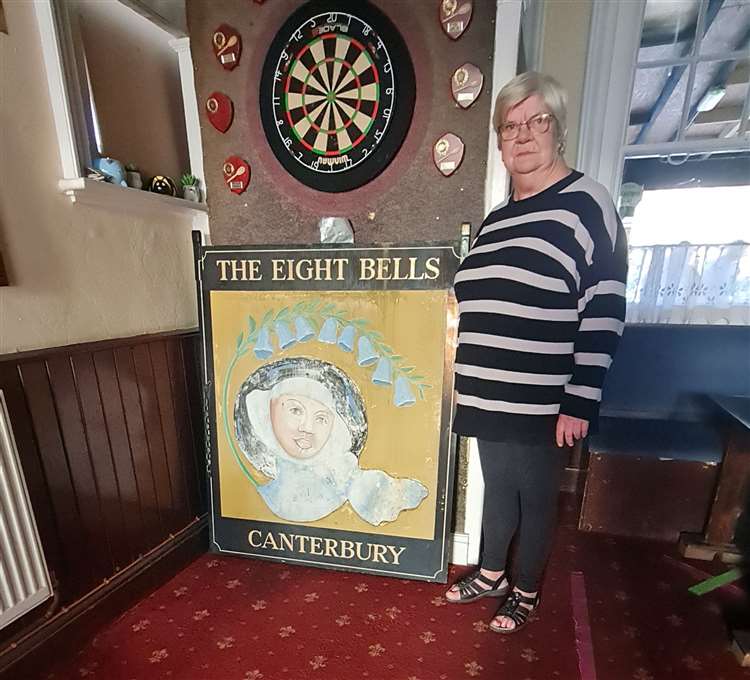
The landlady of The Eight Bells in Canterbury, Kim Truelove with the
much-loved old pub sign.
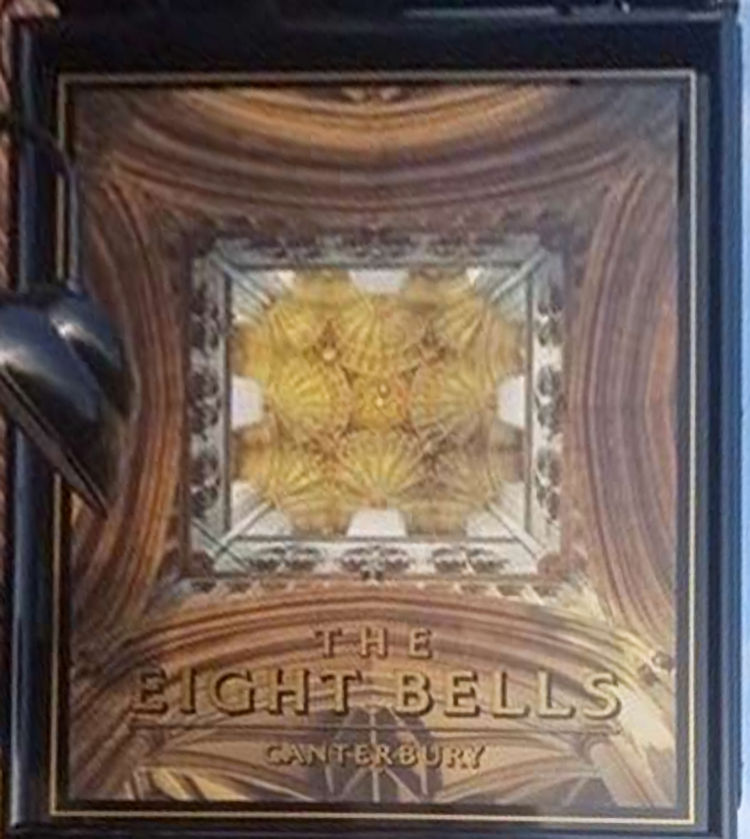
The new pub sign at The Eight Bells.
“I’ve kept the old one and am hoping a local artist might volunteer to
restore it for us, so it can be displayed in the pub.”
Admiral Taverns, which runs more than 1,600 “community pubs” across the
UK, was approached for comment.
|
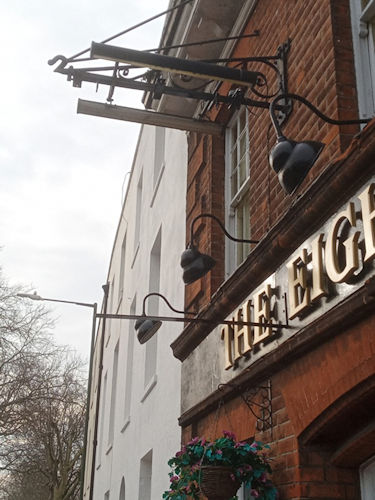 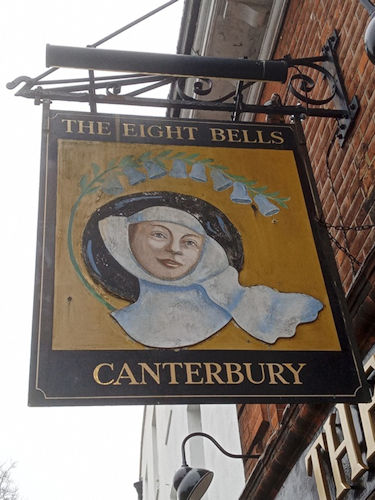
The latest on the fate of the pub sign is that Admiral Taverns first
removed their new sign, leaving an empty frame, then rehung the old sign
but without restoring it. Pics from 18th and 25th February show this.
Admiral's latest pearl of wisdom is that it'll "cost too much to restore
the old sign" and will provide the pub with a new one but along the
lines of the original design. Hmm.... |
Latest news from Rory Kehoe, June 2025: Long-term licensee, Kim Truelove,
will retire in October and the pubco, Admiral Taverns, is reported to have
no plans to seek a new tenant. If the owners simply boards up the premises
and applies for a Change of Use, it's hard to see the pub surviving.
Looks like this one closed on the 26th of October 2025.
|
All photos below, 26 October 2025, kindly sent by Rory Kehoe.
The end of
an era in Canterbury. It was time at the Eight Bells., London Road,
as the licensee (Kim Truelove) is retiring and the PubCo (Admiral
Taverns) isn't seeking a new tenant. The pub is on the market for
£265k and although there has been some interest, the feeling is that
the Bells will not re-open as a pub.
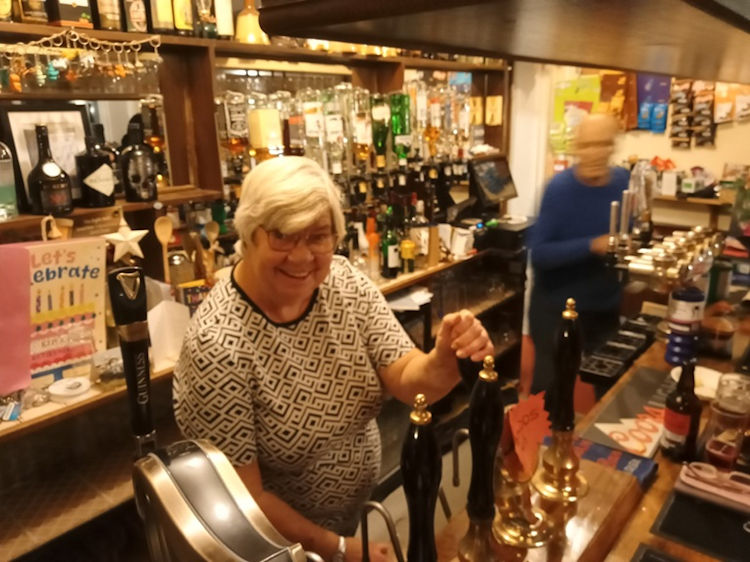
Kim pulling one the last pints that the Bells will ever
likely serve. |
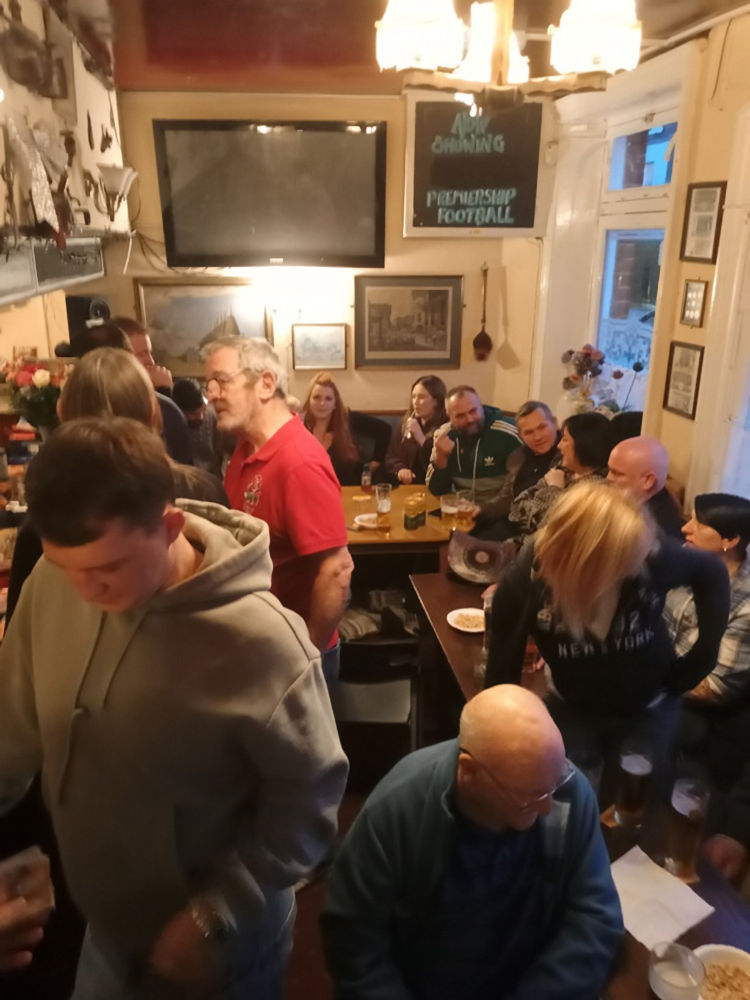
Standing room only, at the bar. |

Photograph shows, spotted in the crowd, local basketball
legend, Tony Homersham, paying his respects to Kim on her retirement
and enjoying a pint of Gadds' No. 5. |
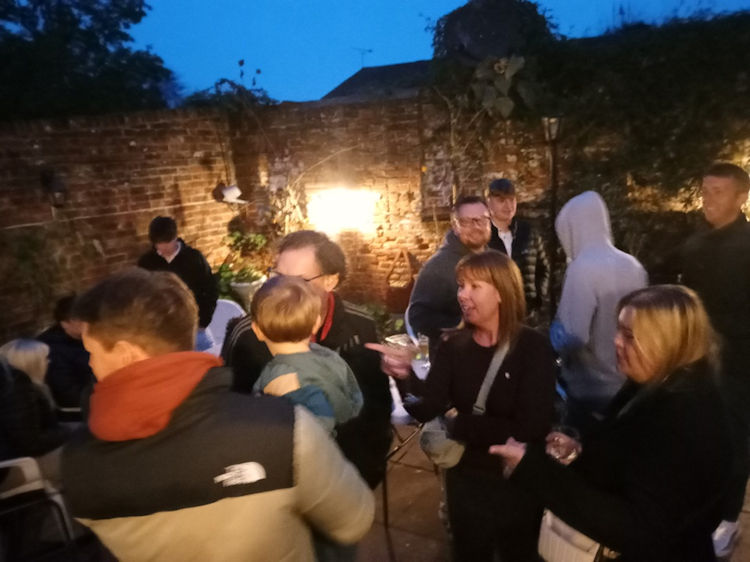
Standing room only, in both the bar and beer garden on Sunday. |
Latest news from Rory Kehoe:- PubCo Admiral Taverns has accepted an offer
for the pub, which is likely to re-open as a free house in early 2026. The
new owner already has a couple of similar pubs in Essex.
LICENSEE LIST
LAYTHEM Nathaniel 1708-19
PRESCOTT Lucy 1719-25
GIBSON Henry 1725-38
PORTSMOUTH Thomas 1738-47
DARLING Thomas 1747-59
ANTIUM Edward 1759-70
WRAIGHT Richard 1770-82
PAYNE Jonathan 1782-95
COLE Isaac P 1795-1813
WACHERS Mary 1819 (widow)
STOKES Thomas 1813-24
STOKES Edward 1824-29

EDMED James 1829-45 (age 61 in 1841 ) )
   
MARSH John to 2/Jan/1845
DAVIS James (Joseph) 2/Jan/1845+-May/1845
SEABROOK Abraham (Edward) 6/Mar/1845+
JAMES Thomas 1847-82
    
COURT William 1882-87
  (livery and stables)
(livery and stables)
DALE William 1887-89
HOPKINS William Richard 1889-95
 
DITTON William 1891 (beer retailer age 63 in 1891 ) )
POLLOCK James S 1895-1903
WINCHESTER Charles 1903-18?
  
HODGES G W 1913+

WOOLSTEN Henry 1917-27?

FEIST John James Stanley 1922+

MOON Henry John 1827-34

GILDER Thomas James 1934-50

GILDER Johnathan 1950-60
MOAT Jack 1960-84
WALLS Derek Alfred 1984-85
WALLS Maureen Kathleen Janet 1985-99
GEORGE June & BOWYER Roger 1999-2002
HUNT David and Hazel 2002-03
HUNT David 2003-06
TRUELOVE Kim & Ryan 2006-25+
https://pubwiki.co.uk/EightBellsLondon.shtml
 From the Pigot's Directory 1824 From the Pigot's Directory 1824
 From the Pigot's Directory 1828-29 From the Pigot's Directory 1828-29
 From the Pigot's Directory 1832-33-34 From the Pigot's Directory 1832-33-34
 Stapleton's
Guide 1838 Stapleton's
Guide 1838
 From the Pigot's Directory 1840 From the Pigot's Directory 1840
 From Bagshaw Directory 1847 From Bagshaw Directory 1847
 From Melville's Directory 1858 From Melville's Directory 1858
 From the Post Office Directory 1862 From the Post Office Directory 1862
 Greens
Canterbury Directory 1868 Greens
Canterbury Directory 1868
 From the Post Office Directory 1874 From the Post Office Directory 1874
 From the Post Office Directory 1882 From the Post Office Directory 1882
 From the Post Office Directory 1891 From the Post Office Directory 1891
 From the Post Office Directory 1903 From the Post Office Directory 1903
 From the Kelly's Directory 1903 From the Kelly's Directory 1903
 From the Post Office Directory 1913 From the Post Office Directory 1913
 From the Post Office Directory 1922 From the Post Office Directory 1922
 From the Post Office Directory 1930 From the Post Office Directory 1930
 From the Post Office Directory 1938 From the Post Office Directory 1938
 Historic
Canterbury web site www.machadoink.com Historic
Canterbury web site www.machadoink.com
|
















